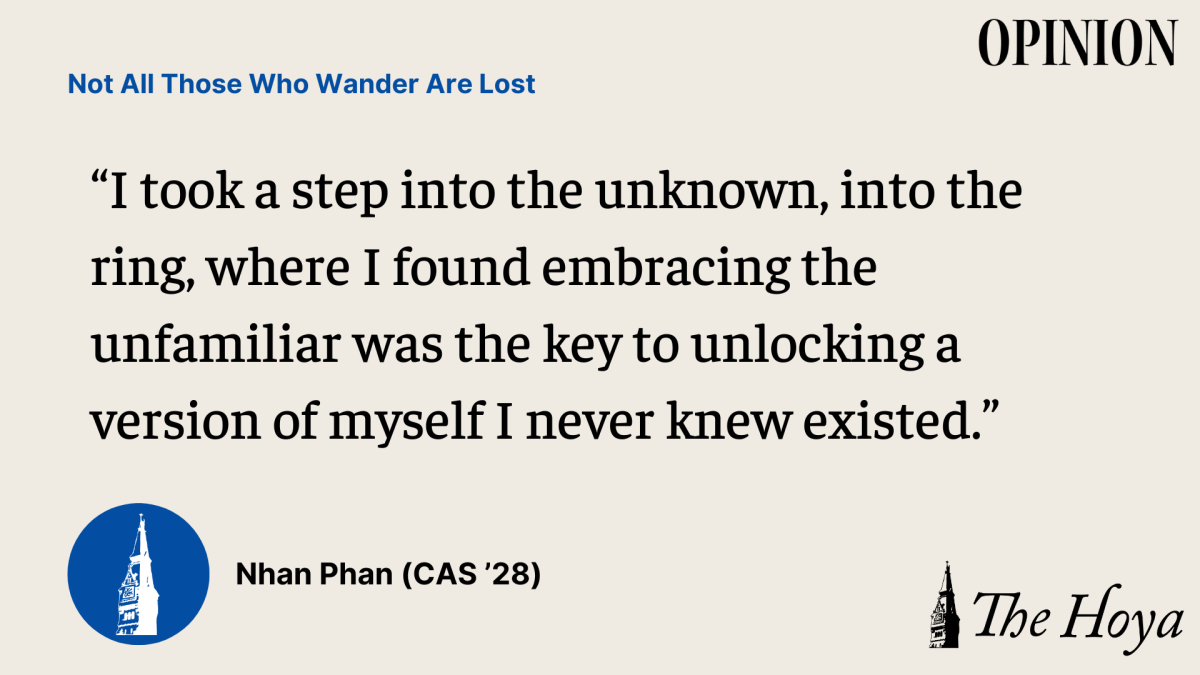
This summer, I began boxing. Being a non-confrontational person, I was originally hesitant about trying out a combat sport. I had always been more comfortable in situations where the objective was to work with others; thus, the thought of stepping into a ring where the goal was to lash out at another felt at odds with who I perceived myself to be.
I didn’t always have the best relationship with my body. Every time I looked in the mirror, I always let out a sigh of, “today’s the day.” Every day was supposed to be the day I began the process of rediscovering myself, but hesitation always found a way to creep in. Stuck in a cycle of wanting change but fearing the discomfort real growth demands, I took a step into the unknown, into the ring, where I found embracing the unfamiliar was the key to unlocking a version of myself I never knew existed.
Admittedly, my first session in the ring was a rude awakening. My form was untrained and awkward, my elbow swinging clumsily as I weakly performed a jab and my feet dragging across the floor lifelessly. But there was a liberating feeling to it all — following my opponent’s movements as if we both were engaging in a partnered, rhythmic dance, my physical exhaustion transforming into an adrenaline-jacked high — that allowed me to punch away the self-doubt and fear that had held me back for so long. Slowly but surely, I was beginning to embrace my discomfort and chipping away at who I thought I was.
After that session, I didn’t recognize myself. I was intense, focusing on myself and my body. I protected my face — a thorough, concentrated defense is just as crucial as an impactful offense. I was aggressive, throwing hooks and jabs far and wide with every ounce of energy I could muster. I was relentless, not willing to stop throwing jab-cross combos when my opponent dropped their hands. I was tired, sweat drops dripping onto the boxing ring floor. I was hurt. I was confident. I was excited. Seeing my body move fluidly in the ring, unrestrained by my perceived inflexible awkwardness, I felt liberated from the self-judgment that had always held me back.
An underappreciated aspect of the process of self-discovery is the overcoming of self-imposed hurdles — whether it’s the fear of failure or the avoidance of discomfort. For a long time, I tried to push past these barriers by making small, safe changes — like joining sports teams or tweaking my daily routine — but each attempt left me no closer to the person I wanted to become.
But maybe I didn’t have to scale my barriers; maybe I could punch through them. At that moment, I saw a version of myself through a hole on the other side of my imaginary wall: a version of me that was unafraid, strong and unapologetically determined. I saw someone who was resilient, who could take hits and keep going, who found freedom for himself not in staying in his comfort zone but in leaving it with conviction. The wall between who I was and who I wanted to be wasn’t as strong and sturdy as I had once thought.
At the beginning of the school year, I found a boxing gym a short bike ride away from campus, excited to continue pursuing my newfound passion for the sport. Looking at myself in the mirror as I wrapped my hands with boxing wraps — three times around the wrist, three times across the knuckles, around the gaps between the fingers, the thumb and back — I now see someone who is slowly and surely getting into the shape he wants to be, someone who is confident in his capabilities and someone who is still learning to embrace his inner strength.
Self-discovery often begins with a single step into the unknown, so I encourage you to embrace discomfort and let it shatter who you thought you were. You might find, as I did, that on the other side of the wall lies a version of yourself that is more resilient, more capable and more alive than you ever thought possible. So go ahead — take that leap, punch through your walls and see what you can achieve.
Nhan Phan is a first-year in the College of Arts and Sciences. This is the first installment of his column “Not All Those Who Wander Are Lost.”